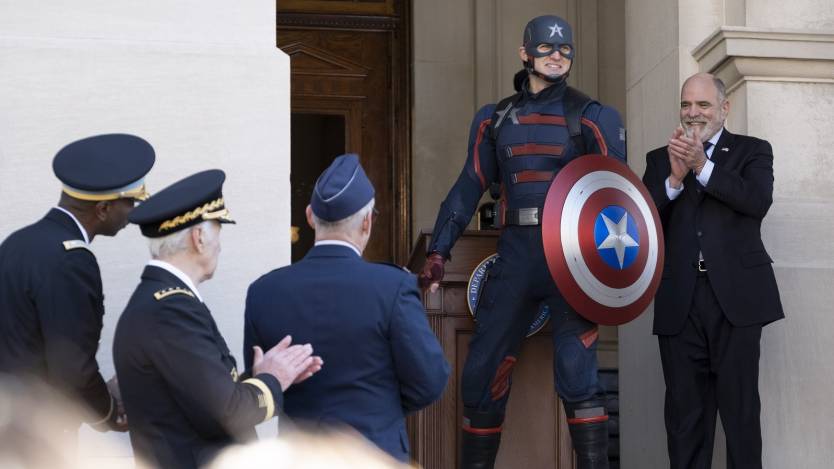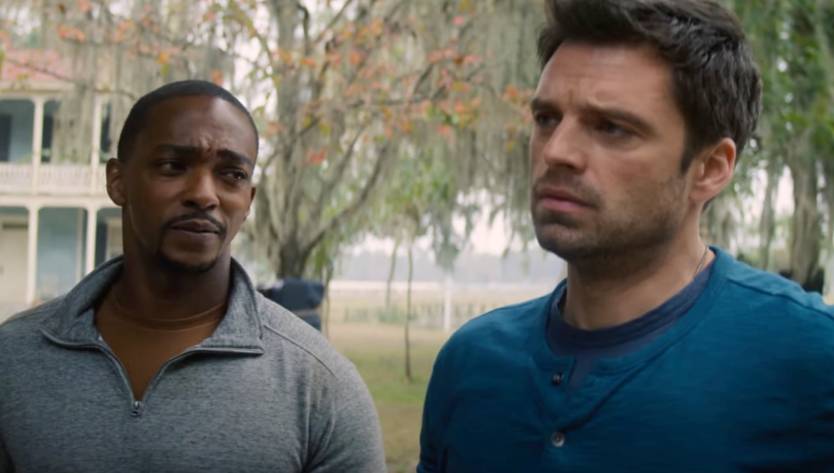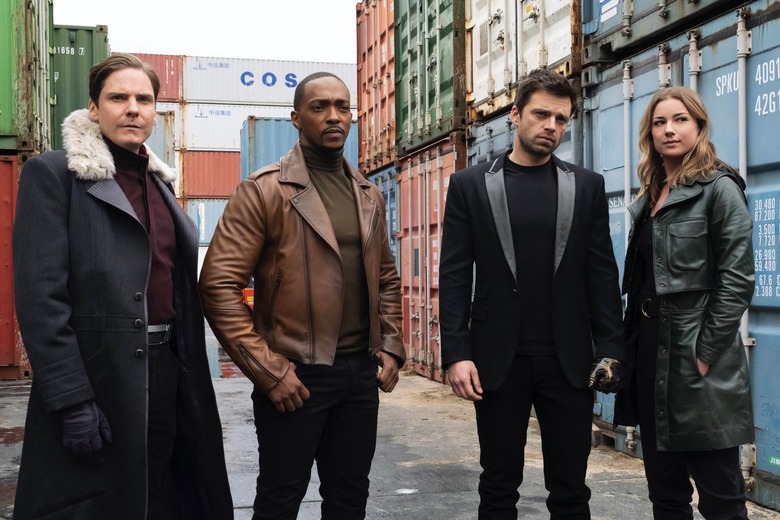People Can't Stop Talking About The First 'Falcon And The Winter Soldier' Post-Credits Scene
It's finally out, the Falcon and the Winter Soldier episode we've all been waiting for. Just as Falcon's showrunner teased in recent interviews, Episode 5 is emotional and it introduces a brand new Marvel character. But the latest Falcon installment has so much more than that. Episode 5 also happens to be the first in the show to feature a post-credits scene, so you'd better stick around until the very end. Titled Truth, the episode also answered two key Avengers: Endgame mysteries, one of which I previously called Falcon's biggest plot hole.
Mind you, a few massive spoilers follow below, so make sure you watch Episode 5 before reading any further.
The cameo
Reports leading up to Episode 5 told us to temper our expectations regarding this mysterious new Marvel character. We knew a well-known actor or actress would play a brand new character who has not appeared in any MCU adventures so far.
That's all you need to know to recognize the moment the character makes her entrance. And once the camera shows us her face, we know instantly this is the cameo we've been waiting for. The Marvel hero we're looking at is Contessa Valentina Allegra de Fontaine. And I swear I could see some of Selina Meyer's humor in Julia Louis-Dreyfus's monologue about the character's actual name.
This time it's not her Elaine from Seinfeld or Selina from Veep that will keep us entertained. "Val" is the kind of spy the MCU needs right now, a shadowy figure to complement Nick Fury (Samuel L. Jackson). It's clear from Val's speech that she's aware of everything happening in this post-blip world and that she's got her own agenda. We can expect to see her again down the road in other MCU TV shows and films, especially the kind that might employ Wyatt Russell's John Walker. But also, the shows that will feature her love interest, who is none other than Nick Fury.
The post-credits scene
John Walker is expected to become US Agent at some point in the future. He's also likely to be part of the upcoming Thunderbolts team-up. The fact that Contessa took an interest in him signals that Walker's adventures won't be done after The Falcon and the Winter Soldier.
Episode 5 concludes with a great post-credits scene teasing the upcoming fight between Sam (Anthony Mackie) and Walker. As some people observed in the trailers preceding this week's episode, Walker will at some point have a different shield by his side. Steve Rogers (Chris Evans) brought Sam a brand new shield from a different reality at the end of Endgame. The shield had a different design than the Captain America shield we saw in other MCU films.

John Walker (Wyatt Russell) in THE FALCON AND THE WINTER SOLDIER.
The post-credits scene explains that teaser clip mystery, showing that Walker is crafting his own shield now that Sam and Bucky (Sebastian Stan) took the real thing and the US government stripped him of his role as Captain America.
The episode does a great job exploring Walker's character in the aftermath of his actions. Russell's acting continues to impress and deserves recognition. It's easy to hate the character for not being what Steve or Sam are, but Walker is a hero in his own mind. He's a soldier who has always done what was asked of him. And he's not about to stop now that he got the serum.
The Endgame mysteries
Before we see how The Falcon and the Winter Soldier concludes and how Sam becomes the world's new Captain America, we have to talk about Marvel's brilliant Endgame Easter eggs in Episode 5. It's not just that they confirm some of our speculation about Endgame's finale, they also fit well with the Captain America journey that Sam is on. He had his own reasons for refusing the shield, but the events that followed, coupled with the emotional revelations from Isaiah Bradley's (Carl Lumbly) speech and Bucky's insistence, have finally convinced Sam to embrace the role and keep fighting these various battles. He won't just be the new Cap. He has a family to worry about and he still has to deal with a world where racial inequality is still a problem, especially after the blip.
Speaking of the shield, Bucky dropped this line in Episode 5, emphasis ours:
When Steve told me what he was planning, I don't think either of us really understood what it felt like for a Black man to be handed the shield. How could we? I owe you an apology. I'm sorry.
Back in Endgame when Steve prepares to return the Infinity Stones to their rightful place, Bucky seems to know that his best friend will not be coming back. And when old-man Steve returns, Bucky tells Sam to go talk to him. Many speculated at the time that Steve and Bucky had already spoken about what was going to happen next. That included Steve staying in a different timeline spend his life with Peggy before passing the Cap mantle to Sam.

Anthony Mackie and Sebastian Stan in "The Falcon and the Winter Soldier."
It's a different, equally simple line that explains Steve's absence, and it comes during the same scene. This time it's Sam telling Bucky that "Steve is gone," and it "might be a surprise, but it doesn't matter what Steve thought." As I've already explained, the two hardly discuss Steve's whereabouts in the previous episodes, although they do reference him quite a few times. We know from the museum scene that he's not dead.
The fact that he is "gone" seems to indicate that Steve is not in this world. He might have gone back to his own timeline, where he still has a life to return to. That's another mystery Endgame did not explain. What did Steve do after bringing Sam a new shield?
More importantly, Sam's line seems to further settle the debate surrounding Steve's retirement. Some fans believed Steve had lived his life in the MCU's main timeline's past after returning the stones, something that wouldn't be possible based on how time travel works in Marvel's stories. The official story is that Steve married Peggy in an alternate timeline, which is the only explanation that makes sense.
